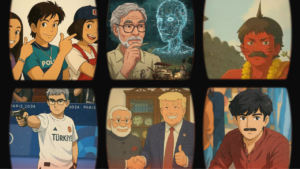Ghibli Filters Scandal: Social media users might want to think twice about those dreamy Ghibli-style photo edits you’ve been loving lately. A viral claim about these popular filters has caused panic among many casual users who often share their lives online through stylized images.
The trend to apply anime-style color palettes and visual magic to normal photos has taken social media by storm. These tools allow anyone to transform their ordinary snaps into works of art that would rival scenes from Studio Ghibli films. Users around the world enjoy these visual treats when they scroll through their feeds each day.
What’s Behind The Panic?
A recent viral social media post claims that certain AI tools could easily strip away these fancy filters to reveal original images that users never meant to share fully with their audience. This worry stems from posts that began making rounds after someone shared their fears about photo privacy being broken through technology.
According to these claims, what users think remains hidden could actually be exposed with simple tech tricks. While many people enjoy using these filters to create dreamy scenes, nobody wants their actual photos to become public without their consent.
The viral posts have raised alarm among “soft launchers” – social media users who share hints about their lives without fully revealing details. These folks often apply heavy filters before they share their images online.
Ghibli Filters Scandal: Truth Behind The Claims
While panic might seem justified, facts paint a different story about these filter fears. Tech experts point out that most photo filters change image data permanently when they apply those dreamy color shifts.
- Most Ghibli-style filters alter pixel values completely
- AI tools cannot “see through” properly applied filters
- Original image data doesn’t remain hidden within edited photos
Digital image experts explain that filters create brand new images rather than simply laying a transparent sheet above your photos. When you apply these anime-style edits, the process makes permanent changes to color values and visual tones.
“The viral claim about AI being able to remove these effects seems based on misunderstanding how image processing truly works,” notes digital security expert Alisha Barnes. “Once pixels have been fully changed, there exists no magic button to revert those alterations.”
Why People Worry
Despite these technical facts, many users still worry about their visual privacy being compromised. Social media allows people to share their lives while still keeping certain aspects private – or so they believed until these viral posts spread fears widely across platforms.
The trend toward “soft launching” relationships makes these concerns even more acute. Many young users share images where their partners might appear, but remain heavily filtered or partially visible. These folks worry their subtle hints could become fully exposed against their wishes.
Social media tends to amplify fears about privacy being violated. Users across major platforms share these warnings without always checking facts behind these claims. This creates waves of panic that spread faster than actual information could catch up.
Ghibli Filters Scandal: How To Protect Your Privacy
If you remain concerned about image privacy, experts suggest several steps to ensure your visual content stays exactly as private as you intend:
- Apply multiple editing layers to important photos
- Save images at a lower resolution before posting online
- Avoid using simple filter apps that might store original copies
- Check privacy terms before using photo editing tools
“The basic truth about digital images means you should always think before you share,” advises online privacy advocate Jason Miller. “No filter offers perfect security if the original photo contains elements you never wanted public.”
Ghibli Filters Scandal: Moving Forward With Filters
Despite these viral scares, photo filters remain hugely popular among social media users. The dreamy visual style that Ghibli filters create brings magic to everyday moments worth sharing with friends.
Tech experts agree that while caution about online sharing always makes sense, panic about filter removal tools seems largely unfounded. The actual technology behind most image filters creates changes that cannot simply be reversed through basic AI tools.
You might still enjoy these beautiful edits without excess worry about your private details being exposed. When used properly, these visual tools allow creative expression while maintaining boundaries that matter most to users.
Social media trends often bring waves of both enjoyment and concern as people navigate their online presence. The Ghibli filter panic serves as another reminder that digital literacy helps users make smart choices about what they share and how they share it.
As trends evolve, your awareness about how visual tools actually work becomes your best defense against unnecessary worries about online privacy. Enjoy those dreamy filters – just apply them wisely.








Be First to Comment